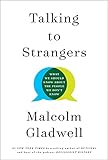Talking to strangers : what we should know about the people we don't know / Malcolm Gladwell.
Publisher: New York : Little, Brown and Company, 2019Copyright date: 2019Edition: First editionDescription: xii, 386 pages : illustrations ; 22 cmContent type:- text
- unmediated
- volume
- 9780316478526
- 0316478520
- 9780316536233
- 0316536237
- 9780316536240
- 0316536245
- What we should know about the people we don't know
- What we should know about the people we do not know
- 302 23
- HM1106 .G58 2019
- HM1111 .G53 2019
| Item type | Current library | Call number | Copy number | Status | Date due | Barcode | Item holds |
|---|---|---|---|---|---|---|---|
 BOOK
BOOK
|
NCAR Library Foothills Lab | HM1106 .G58 2019 | 1 | Available | 50583020010504 |
Includes bibliographical references (pages 349-379) and index.
Introduction: "Step out of the car!" -- Part one: Spies and diplomats: two puzzles. Fidel Castro's revenge ; Getting to know der Fuhrer -- Part two: Default to truth. The queen of Cuba ; The holy fool ; Case study: The boy in the shower -- Part three: Transparency. The Friends fallacy ; A (short) explanation of the Amanda Knox case ; Case study: The fraternity party -- Part four: Lessons. KSM: what happens when the stranger is a terrorist? -- Part five: Coupling. Sylvia Plath ; Case study: The Kansas City experiments ; Sandra Bland.
In this thoughtful treatise spurred by the 2015 death of African-American academic Sandra Bland in jail after a traffic stop, New Yorker writer Gladwell (The Tipping Point) aims to figure out the strategies people use to assess strangers-to "analyze, critique them, figure out where they came from, figure out how to fix them," in other words: to understand how to balance trust and safety. He uses a variety of examples from history and recent headlines to illustrate that people size up the motivations, emotions, and trustworthiness of those they don't know both wrongly and with misplaced confidence.
